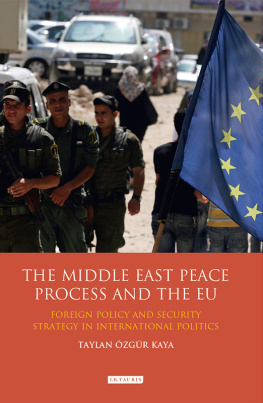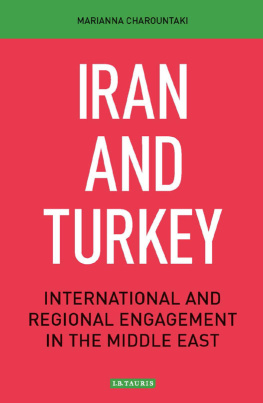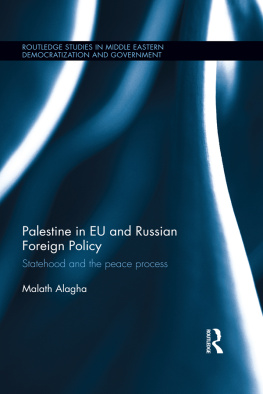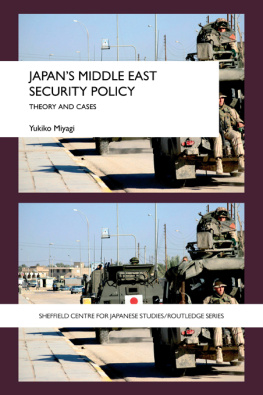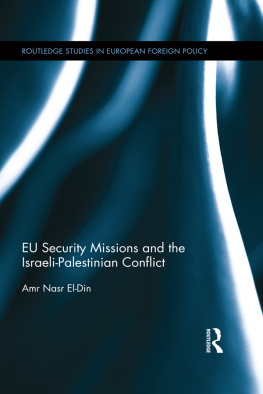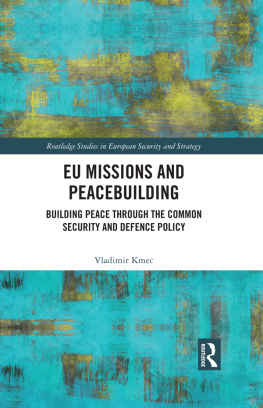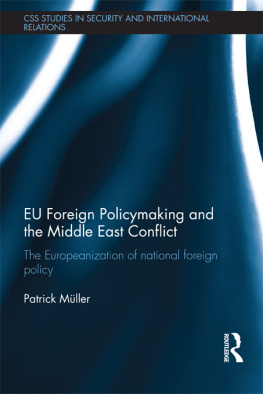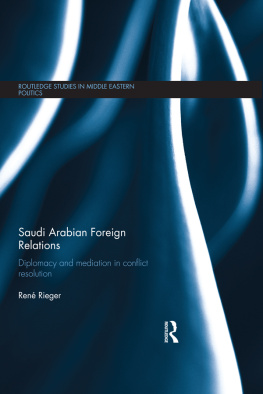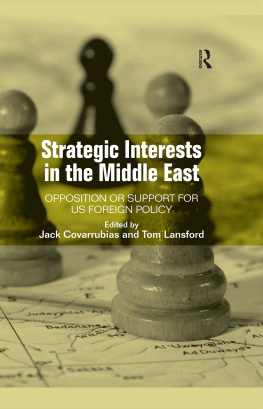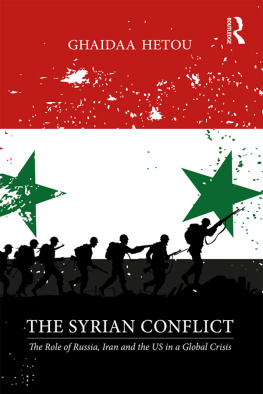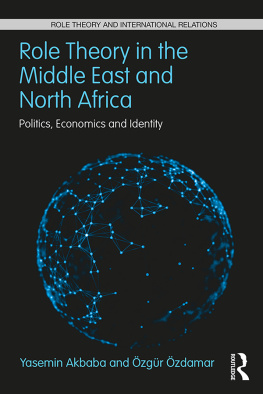Taylan zgr Kaya is Assistant Professor in the International Relations Department at Necmettin Erbakan University, Konya, Turkey. He holds a PhD from the Department of International Relations at the Middle East Technical University, Turkey.

Published in 2013 by I.B.Tauris & Co Ltd
6 Salem Road, London W2 4BU
175 Fifth Avenue, New York NY 10010
www.ibtauris.com
Distributed in the United States and Canada
Exclusively by Palgrave Macmillan
175 Fifth Avenue, New York NY 10010
Copyright 2013 Taylan zgr Kaya
The right of Taylan zgr Kaya to be identified as the author of this work has been asserted by the author in accordance with the Copyright, Designs and Patent Act 1988.
All rights reserved. Except for brief quotations in a review, this book, or any part thereof, may not be reproduced, stored in or introduced into a retrieval system, or transmitted, in any form or by any means, electronic, mechanical, photocopying, recording or otherwise, without the prior written permission of the publisher.
Library of European Studies 20
ISBN 978 1 84885 982 1
A full CIP record for this book is available from the British Library
A full CIP record for this book is available from the Library of Congress
Library of Congress catalog card: available
Typeset by Newgen Publishers, Chennai
To Asl with loveCONTENTS
ACKNOWLEDGEMENTS
This book is based on my PhD thesis, which I submitted at the Middle East Technical University (METU) in 2010. It is a pleasure for me to express my gratitude to those who made this book possible with their contributions. First of all, I wish to express my sincere gratitude to my PhD thesis supervisor at the Department of International Relations, METU, Associate Professor Sevilay Kahraman for her supervision, comments, criticism and guidance, which helped me refine my ideas and arguments.
I am grateful to Professor Hseyin Bac and Associate Professor Pnar Bilgin for taking time out of their busy schedules to participate in the meetings of my thesis supervising committee and their invaluable comments, criticisms and guidance.
I wish to acknowledge my debt of gratitude to METU for providing me a stimulating academic environment and excellent research opportunities without which this book would not have been possible.
I am indebted to Professor Adrian Hyde-Price and the University of Leicester for providing me an invaluable opportunity to spend an academic year as a research student at the Politics and International Relations Department. I am also grateful to the British Council for awarding me the British Chevening Scholarship, which enabled me to conduct my PhD research at the University of Leicester.
I owe a special debt of gratitude to my interviewees in Brussels, who took time out of their busy schedules to answer my questions and provide me very insightful information about the EUs role in the Middle East Peace Process.
Special thanks go to my editors at I.B.Tauris, Maria Marsh and Nadine El-Hadi, for all their kind help and invaluable comments and guidance through the book production process. I express my sincere appreciation to Pat Fitzgerald for copyediting and proofreading.
I owe my deepest gratitude to my parents, Tuna and Cevdet. I remain eternally grateful to them for their unwavering support, encouragement, love and confidence in me.
Words fail me to express my appreciation to my wife, Asl to whom this book is dedicated. Her unfaltering support, encouragement, patience, enduring love and confidence in me have proven invaluable. This book would not have been possible without her support and encouragement.
Finally, I would like to thank everybody who supported me in any respect during the completion of this book, as well as expressing my apologies to all whom I could not mention personally one by one.
LIST OF TABLES
Basic Typology of EUs Role Conceptions in the Post-9/11 Era Emerging from Preliminary Role Analysis
EUs Role Set in the Post-9/11 Era
EUs financial support for the Palestinians during the period between 2001 and 2006
LIST OF ABBREVIATIONS
| ASEAN | Association of Southeast Asian Nations |
| CFSP | Common Foreign and Security Policy |
| CIA | Central Intelligence Agency |
| EC | European Community |
| ECU | European Currency Unit |
| EMP | Euro-Mediterranean Partnership |
| ENP | European Neighbourhood Policy |
| EOM | European Union Election Observer Mission |
| EPC | European Political Cooperation |
| ESDP | European Security and Defence Policy |
| ESS | European Security Strategy |
| EUBAM Rafah | European Union Border Assistance Mission for the Rafah Crossing Point |
| EU | European Union |
| EUCOPPS | EU Coordinating Office for Palestinian Police Support |
| EUFP | European Union Foreign Policy |
| EUPOL COPPS | European Union Police Mission for the Palestinian Territories |
| EUSR | European Union Special Representative for the Middle East Peace Process |
| Fatah | Harakat al-Tahrir al-Watani al-Filastini (Palestinian National Liberation Movement) |
| GAERC | General Affairs and External Relations Council |
| GMP | Global Mediterranean Policy |
| Hamas | Harakat Al-Muqawama Al-Islamiya (Islamic Resistance Movement) |
| IMF | International Monetary Fund |
| MEDA | Mesures dAccompagnement (Accompanying Measures) |
| MEPP | Middle East peace process |
| MERCUSOR | Mercado Comun del Sur (Southern Common Market) |
| MFO | Multinational Sinai Force and Observers |
| NATO | North Atlantic Treaty Organization |
| NGO | Non-governmental Organization |
| OPEC | Organization of Petroleum Exporting Countries |
| PEGASE | Palestino-Europen de Gestion et dAide Socio-Economique (European Mechanism of Support to the Palestinians) |
| PLO | Palestine Liberation Organization |
| REDWG | Regional Economic Development Working Group |
| SFOR | Stabilization Force in Bosnia Herzegovina |
| SME | Small and Medium-Sized Enterprises |
| TEU | Treaty on European Union |
| TIM | Temporary International Mechanism |
| UK | United Kingdom |
| UN | United Nations |
| UNIFIL | United Nations Interim Force in Lebanon |
| UNRWA | United Nations Relief and Works Agency |
| US | United States |
| USA | United States of America |
| USSR | Union of Soviet Socialist Republics |
CHAPTER 1
INTRODUCTION
Since 1999, EU Member States have striven to consolidate the EUs CFSP and the EU has become an important foreign and security policy actor in international politics. At the Cologne European Council on 34 June 1999, the defence dimension of the EUs foreign and security policy, the ESDP was introduced. In the post-9/11 era, the CFSP and the ESDP have gained substance and momentum. Jolyon Howorth and John T.S. Keeler (2003: 15) have put forward the opinion that 9/11 made the case for the ESDP even more compelling. In this area, significant elements of integration emerged. Institutional struggles were left behind and a range of EU actors and agencies started to work together to develop a coherent political approach to the crises (ibid.). In the post-9/11 era, the EU started to become one of the key foreign and security policy actors in the international arena with the ability to use a full range of instruments including military ones in addition to civilian ones for crisis management and conflict prevention. Michael Smith called this the process of hardening of European foreign and security policy. He argued that particularly since the late 1990s, there was a process of hardening which has led to an injection of hard as opposed to soft security into the European foreign and security policy process, particularly through the elaboration of the ESDP (Smith 2006: 40).

